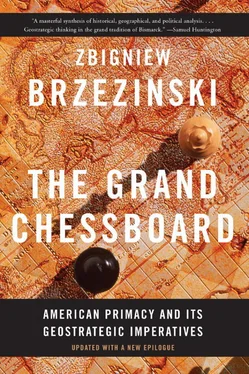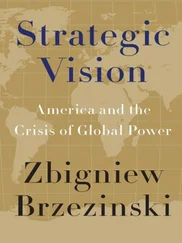Large-scale international investment in an increasingly accessible Caspian–Central Asian region would not only help to consolidate the independence of its new countries but in the long run would also benefit a postimperial and democratic Russia. The tapping of the region’s energy and mineral resources would generate prosperity, prompting a greater sense of stability and security in the area, while perhaps also reducing the risks of Balkan-type conflicts. The benefits of accelerated regional development, funded by external investment, would also radiate to the adjoining Russian provinces, which tend to be economically underdeveloped. Moreover, once the region’s new ruling elites come to realize that Russia acquiesces in the region’s integration into the global economy, they will become less fearful of the political consequences of close economic relations with Russia. In time, a nonimperial Russia could thus gain acceptance as the region’s preeminent economic partner, even though no longer its imperial ruler.
To promote a stable and independent southern Caucasus and Central Asia, America must be careful not to alienate Turkey and should explore whether an improvement in American-Iranian relations is feasible. A Turkey that feels that it is an outcast from Europe, which it has been seeking to join, will become a more Islamic Turkey, more likely to veto the enlargement of NATO out of spite and less likely to cooperate with the West in seeking both to stabilize and integrate a secular Central Asia into the world community.
Accordingly, America should use its influence in Europe to encourage Turkey’s eventual admission to the EU and should make a point of treating Turkey as a European state—provided internal Turkish politics do not take a dramatic turn in the Islamist direction. Regular consultations with Ankara regarding the future of the Caspian Sea basin and Central Asia would foster in Turkey a sense of strategic partnership with the United States. America should also strongly support Turkish aspirations to have a pipeline from Baku in Azerbaijan to Ceyhan on the Turkish Mediterranean coast serve as major outlet for the Caspian Sea basin energy sources.
In addition, it is not in America’s interest to perpetuate American-Iranian hostility. Any eventual reconciliation should be based on the recognition of a mutual strategic interest in stabilizing what currently is a very volatile regional environment for Iran. Admittedly, any such reconciliation must be pursued by both sides and is not a favor granted by one to the other. A strong, even religiously motivated but not fanatically anti-Western Iran is in the U.S. interest, and ultimately even the Iranian political elite may recognize that reality. In the meantime, American long-range interests in Eurasia would be better served by abandoning existing U.S. objections to closer Turkish-Iranian economic cooperation, especially in the construction of new pipelines, and also to the construction of other links between Iran, Azerbaijan, and Turkmenistan. Long-term American participation in the financing of such projects would in fact also be in the American interest. [2]
India’s potential role needs also to be highlighted, although it is currently a relatively passive player on the Eurasian scene. India is contained geopolitically by the Chinese-Pakistani coalition, while a weak Russia cannot offer it the political support once provided by the Soviet Union. However, the survival of its democracy is of importance in that it refutes better than volumes of academic debate the notion that human rights and democracy are purely a parochial Western manifestation. India proves that antidemocratic “Asian values,” propagated by spokesmen from Singapore to China, are simply antidemocratic but not necessarily characteristic of Asia. India’s failure, by the same token, would be a blow to the prospects for democracy and would remove from the scene a power that contributes to greater balance on the Asian scene, especially given China’s rise to geopolitical preeminence. It follows that a progressive engagement of India in discussions pertaining to regional stability, especially regarding the future of Central Asia, is becoming timely, not to mention the promotion of more directly bilateral connections between American and Indian defense communities.
Geopolitical pluralism in Eurasia as a whole will neither be attainable nor stable without a deepening strategic understanding between America and China. It follows that a policy of engaging China in a serious strategic dialogue, eventually perhaps in a three-way effort that involves Japan as well, is the necessary first step in enhancing China’s interest in an accommodation with America that reflects the several geopolitical interests (especially in Northeast Asia and in Central Asia) the two countries in fact share in common. It also behooves America to eliminate any uncertainties regarding America’s own commitment to the one-China policy, lest the Taiwan issue fester and worsen, especially after China’s absorption of Hong Kong. By the same token, it is in China’s own interest to make that absorption a successful demonstration of the principle that even a Greater China can tolerate and safeguard increased diversity in its internal political arrangements.
While—as argued earlier in chapters 4 and 6—any would-be Chinese-Russian-Iranian coalition against America is unlikely to jell beyond some occasional tactical posturing, it is important for the United States to deal with China in a fashion that does not drive Beijing in that direction. In any such “antihegemonic” alliance, China would be the linchpin. It would be the strongest, the most dynamic, and thus the leading component. Such a coalition could only emerge around a disaffected, frustrated, and hostile China. Neither Russia nor Iran has the wherewithal to be the central magnet for such a coalition.
An American-Chinese strategic dialogue regarding the areas that both countries desire to see free of domination by other aspiring hegemons is therefore imperative. But to make progress, the dialogue should be sustained and serious. In the course of such communication, more contentious issues pertaining to Taiwan and even to human rights could then be addressed more persuasively. Indeed, the point can be made quite credibly that the issue of China’s internal liberalization is not a purely domestic Chinese affair, since only a democratizing and prosperous China has any prospect of peacefully enticing Taiwan. Any attempt at forcible reunification would not only place the American-Chinese relationship in jeopardy but would inevitably generate adverse consequences for China’s capacity to attract foreign capital and sustain its development. China’s own aspirations to regional preeminence and global status would thereby be victimized.
Although China is emerging as a regionally dominant power, it is not likely to become a global one for a long time to come (for reasons stated in chapter 6)—and paranoiac fears of China as a global power are breeding megalomania in China, while perhaps also becoming the source of a self-fulfilling prophesy of intensified American-Chinese hostility. Accordingly, China should be neither contained nor propitiated. It should be treated with respect as the world’s largest developing state, and—so far at least—a rather successful one. Its geopolitical role not only in the Far East but in Eurasia as a whole is likely to grow as well. Hence, it would make sense to coopt China into the G-7 annual summit of the world’s leading countries, especially since Russia’s inclusion has widened the summit’s focus from economics to politics.
As China becomes more integrated into the world system and hence less able and less inclined to exploit its regional primacy in a politically obtuse fashion, it also follows that a de facto emergence of a Chinese sphere of deference in areas of historic interest to China is likely to be part of the emerging Eurasian structure of geopolitical accommodation. Whether a united Korea will oscillate toward such a sphere depends much on the degree of Japanese-Korean reconciliation (which America should more actively encourage), but in any case, the reunification of Korea without an accommodation with China is unlikely.
Читать дальше












